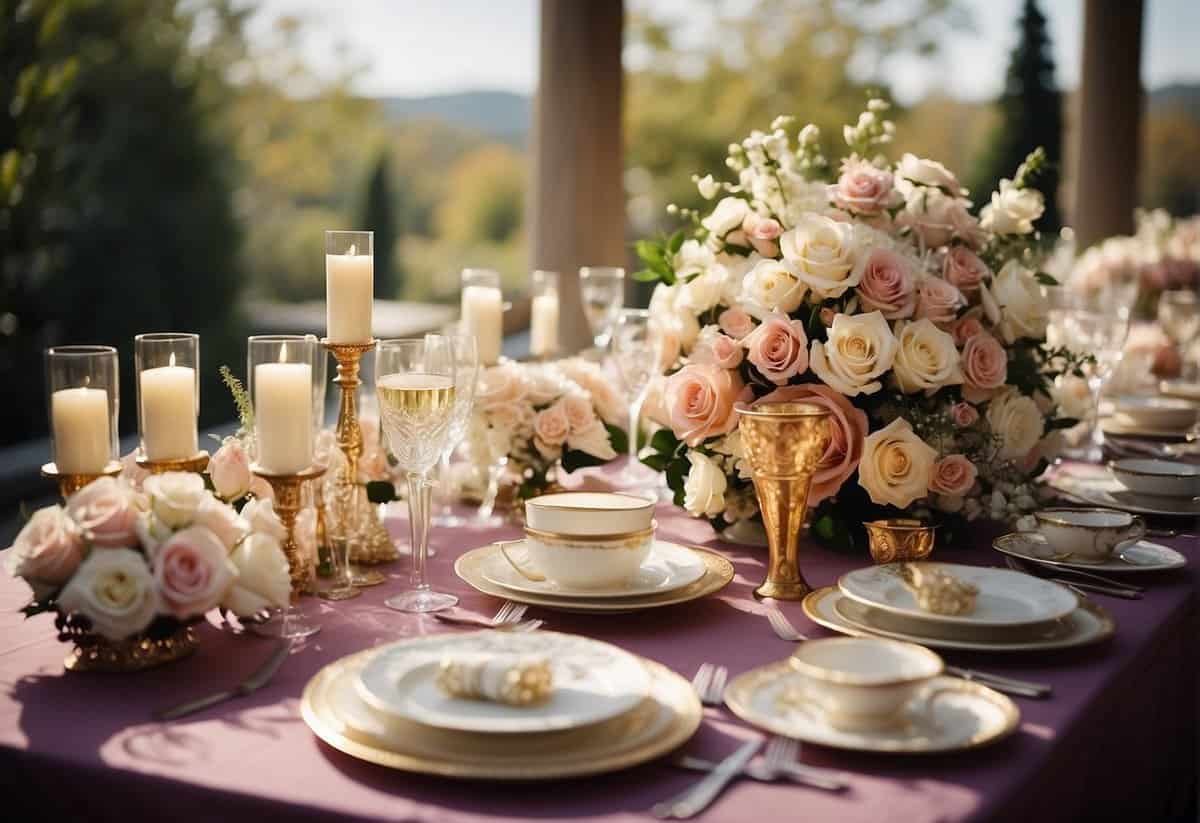What is a Waste of Money for a Wedding? Top Unnecessary Expenses Revealed
When planning your special day, it’s easy to get swept away in the excitement and lose track of your budget. The pressure to create a perfect wedding can lead to spending on items that might not contribute meaningfully to your experience. With careful consideration, you can discern which expenditures will enhance your celebration and which are simply a drain on your resources. By prioritizing aspects that are truly important to you and your guests, it’s possible to celebrate your union without the burden of unnecessary financial strain.

Sometimes, it’s the extras marketed as ‘must-haves’ by the wedding industry that can inflate your budget without adding real value. Whether it’s overpriced favors that guests may forget to take home or extravagant flower arrangements that wilt away, distinguishing between the essential and the excessive is key. Staying true to your vision and focusing on elements that bring joy to you and your partner can create a memorable event that’s both beautiful and debt-free. Your wedding day should reflect your shared values and priorities, leaving you with happy memories instead of financial regrets.
Key Takeaways
- Evaluate each wedding expense to ensure it aligns with what truly matters to you and your guests.
- Opt for elements that add meaningful value to your celebration and remain within budget.
- Prioritize genuine experiences and connections over costly, unnecessary extras to stay debt-free.
Understanding Wedding Finances

Managing your wedding finances effectively means staying informed and making choices that align with your financial reality. A smart approach can help you enjoy your special day without the burden of unnecessary debt.
Setting a Realistic Budget
Your wedding budget is the financial blueprint for your big day. Start by determining a total amount you’re comfortable spending. Break this down into categorized expenses, such as venue, catering, attire, and entertainment. It’s vital to be realistic about what you can afford to avoid financial strain. For instance, if a planner advises that couples often allocate about 7% of their budget on attire, for a $20,000 budget, that translates to $1,400 for your outfits.
- Total Budget: $20,000
- Venue: 50%
- Catering: 20%
- Attire: 7%
- Entertainment: 8%
- Miscellaneous: 15%
Navigating the Wedding Industry
The wedding industry can be complex, with many vendors competing for your money. It’s important to compare prices and services to ensure you’re getting value for your money. Be wary of “must-have” trends and services that inflate costs—some items may not be essential for a memorable experience. For example, a survey by Business Insider highlights how certain elements, like extravagant flower arrangements, may significantly increase wedding costs without enhancing your day.
Remember, every choice should reflect your personal priorities and financial limits. Maintain a clear focus on your envisioned celebration while approaching each spending decision with a balance of emotion and pragmatism.
Major Expenses to Consider

When planning your special day, it’s important to allocate your budget wisely across several key areas to ensure your wedding is memorable without unnecessary financial strain.
Deciding on the Venue
Choosing the venue is perhaps the most significant decision affecting your budget. Your choice sets the stage for your reception and can dictate the tone and style of your entire event. Venues range widely in cost depending on location, size, and time of year. Remember to consider what’s included, such as furniture and audio equipment, as this can affect overall expenses. For example, some venues may require you to use in-house catering, which can be more costly.
Selecting Food and Catering Options
Food is a central part of the celebration, and the catering options you select can represent a large portion of your budget. To manage costs without compromising quality, consider seasonal and locally available food and be realistic about the amount needed. Serving styles, like buffets or plated dinners, also influence pricing, so weigh the experience against the expense.
Choosing the Right Attire
Your wedding dress will be a focal point of your big day, but it doesn’t have to break the bank. Explore a range of options, bearing in mind that designer labels carry higher price tags. For groom and bridesmaid dresses, consider less formal attire that could be worn again. Remember to factor in the cost of shoes and makeup, and it’s often possible to save by shopping off-season sales or selecting simpler designs that are just as elegant.
Avoiding Unnecessary Extras

When planning your wedding, it’s easy to get caught up in the details and feel you need to include every traditional element. However, being selective about what you include can not only save money but also create a more personalized experience. Here are some areas you can reconsider.
Rethinking Wedding Favors and Programs
Wedding Favors: While it’s a nice gesture to give guests a token of appreciation, often wedding favors go unused or forgotten. Instead, consider a small, meaningful gift that is likely to be appreciated, such as a donation to a charity on behalf of your guests. If you really want something tangible, edible favors like a special treat or a local delicacy can be a hit.
Wedding Programs: Printed programs are another cost that can add up. Guests tend to glance at them briefly during the ceremony and then leave them behind. Save on design and printing costs by creating a digital program available via a QR code or a simple sign at the entrance with the ceremony details.
Questioning the Price Tag of Decorations
Decor can transform a venue, but it’s easy to overdo it. Focus on a few statement pieces, like an eye-catching centerpiece or unique lighting, instead of an abundance of flowers and trinkets. Remember that sometimes the venue’s own ambiance and beauty can minimize the need for additional decorations.
Dodging Extravagant Extras
Lastly, avoid falling into the trap of ‘must-have’ extras. For instance, releasing live doves may seem picturesque, but it can be expensive and logistically complicated. Similarly, rather than splurge on an ornate show cake, opt for a modestly designed one and then have a larger sheet cake in the kitchen to serve guests. Photobooths, while fun, can be a considerable expense; set up a DIY photo area with a friend taking polaroids or a selfie station with props instead. Rethink the need for items like a guest book that might not be looked at often after the big day.
Focusing on Meaningful Aspects

When planning your wedding, remember that the day is a celebration of your love and commitment. It’s about the moments you’ll cherish, not just the items you purchase.
Prioritizing Experiences Over Things
Photography is an essential aspect where it’s worth investing because long after the day is over, it’s the frozen moments in time that bring back the warmth and joy of your wedding day. Instead of overspending on extravagant decor, consider allocating a larger portion of your budget to a talented photographer whose style matches the mood you want to remember.
- Invest in a quality photographer who can capture the essence of your day.
- Choose meaningful locations for your photos that reflect your relationship.
Investing in Memories
Your honeymoon is an opportunity to create incredible memories together and recover from the excitement and stress of the wedding day. Prioritize experiences that allow you to bond and relax as a newly married couple.
- Instead of purchasing expensive rings that might strain your budget, select rings that are meaningful to you both, regardless of the price tag.
- Allocate funds towards your honeymoon or experiences you can enjoy during your first year of marriage.
Remember, the worth of your wedding does not reflect the strength of your marriage. It’s the love and memories that count.
Frequently Asked Questions

When planning your wedding, it’s essential to recognize where you might unnecessarily spend money. Understanding commonly regretted expenses and finding budget-friendly alternatives can help you allocate your funds wisely.
What are some commonly regretted wedding expenses?
Late-night snacks, while a fun idea, are often unnecessary as guests have usually just finished eating. Many couples also find that spending excessively on custom wedding programs becomes regrettable when most guests pay them little attention.
Which wedding elements are considered unnecessary splurges?
Extravagant decor, such as elaborate fresh flowers, can be a heavy strain on your budget with limited impact. Similarly, costly favors and expensive champagne for toasts may not significantly enhance your guests’ experience.
What should couples avoid overspending on for their wedding day?
Avoid lavish spending on items that do not contribute to the overall enjoyment of your day, such as overly elaborate wedding invitations, which may not be as valued by guests as you might expect.
How can you save money on wedding features that guests won’t notice?
Focus on what’s meaningful and noticeable—like good food and music. For instance, cutting costs on invitations and programs by opting for simpler designs or digital versions can make a difference without detracting from the guests’ experience.
What are some budget-friendly alternatives to traditional wedding expenses?
Consider using seasonal flowers for decorations, hosting your wedding during off-peak times for venues, and crafting your own creative but cost-effective favors to add a personal touch without breaking the bank.
What are the biggest misconceptions about necessary wedding costs?
A significant misconception is that a successful wedding must be lavish. In reality, many of the most memorable weddings are those that are intimate and personal, regardless of the cost. Prioritizing what’s most important to you can make your wedding day just as special without excessive spending.

